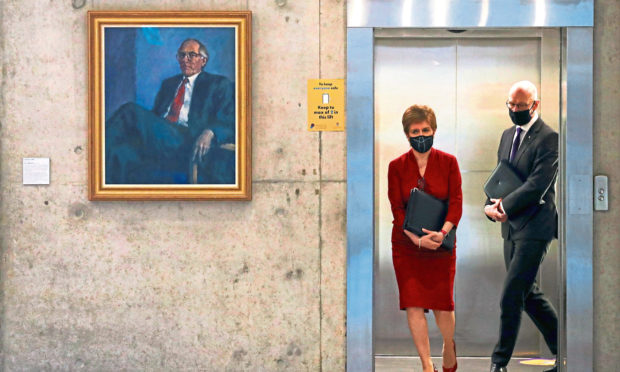Few politicians have been as well-liked and respected by friend and foe as John Swinney. For years, Scotland’s deputy first minister has traded on his reputation for decency and empathy, and a winning, almost town-clerk straightness.
In a profession where manipulation, subterfuge and a remorseless pursuit of one’s opponent is the norm, Swinney seemed to stay above the fray. Not for nothing did he attract the nickname Honest John.
It’s for this reason that one can detect an unusual level of sadness and regret among the hard-shell hacks and pitiless political assassins at the apparent deterioration of Swinney’s integrity. If even the holy man of Holyrood is a sinner, what hope is there for the rest?
The Alex Salmond scandal is poisoning everything and everyone it touches. Whether you are in Camp Sturgeon or Camp Salmond, you are being asked to swallow a great deal of poor behaviour and often worse as both sides battle for advantage and ultimate victory. Even the neutrals, such as the Lord Advocate James Wolffe, have been dragged into the swamp.
No one involved, apart from the relentlessly interrogative Jackie Baillie, is going to emerge with their reputation enhanced. This includes Swinney. His role in withholding evidence from the Holyrood inquiry into the government’s handling of the Salmond complaints has done him great damage.
It is probably inevitable that Swinney would find himself compromised. The deputy first minister is an immensely powerful man who is at the heart of all the government’s big decisions. He has been around the top of his party for more than two decades, including a brief, unsuccessful spell as leader, and has been a senior minister in both combatants’ cabinets. He has been privy to all their strengths, weaknesses, plots and errors, and remained loyal to a fault.
That loyalty is what has now got him into trouble. MSPs had twice voted that ministers should publish the legal advice they were given when Salmond took the government to court in pursuit of a judicial review. The vote was twice ignored. It was only last week, with Swinney facing a personal vote of no confidence – which, with the Greens on board, would have passed – that the advice was finally released.
Even then, it was done in such deliberately piecemeal fashion – dribbled out in bits, either side of Nicola Sturgeon’s crucial evidence to the committee – that it served to obstruct clarity and accountability, rather than enhance them.
Swinney has argued that publishing the lawyers’ notes would set a dangerous precedent. This is hogwash. No one is suggesting that every piece of advice to ministers be made public. But in a case of this magnitude and import, with the reputation of the two most-recent first ministers, the wider government and civil service, the Crown prosecutor, some of Scotland’s top counsel, and Holyrood itself at stake, the attempt to withhold such vital documents was shameful. Then there’s the little matter of the administration’s £500,000-plus spend in its failed attempt to defend itself against Salmond.
It has all created the impression that the SNP government is secretive, sneaky, unaccountable and arrogant. We are entitled to ask what else has been hidden from us over the past 14 years. Why are the Nationalists so terrified of transparency? How, from this example, can we trust the case they make for independence? Swinney is also the education secretary. His tenure in that post, like most of his predecessors, has been undistinguished. Too many of Scotland’s schools continue to bump around in the doldrums. Every confrontation with the ultra-conservative education establishment has been swerved. Reform has been bottled for the sake of keeping the peace, and political capital hoarded for the independence struggle.
Children have not been put first. The support extended during the Covid lockdown has been patchy at best, with no sense whatsoever that Education Scotland, the schools agency, has risen to the challenge of home-schooling or the catch-up now required – they have been unresponsive, unambitious, lacking any gumption when it comes to innovation, and have been left behind by their equivalents south of the border. As usual, it is the kids who most need help who will suffer most. And how unsurprising that an OECD report into the misfiring Curriculum for Excellence, which was due to be published in February, will instead be released in June, conveniently after May’s election. The minister will be neither accountable nor embarrassed.
It is difficult to avoid the judgment that Swinney has, for the sake of party politics and an easier life, let down both the electorate and the nation’s children. In doing so, Honest John has let himself down too.

